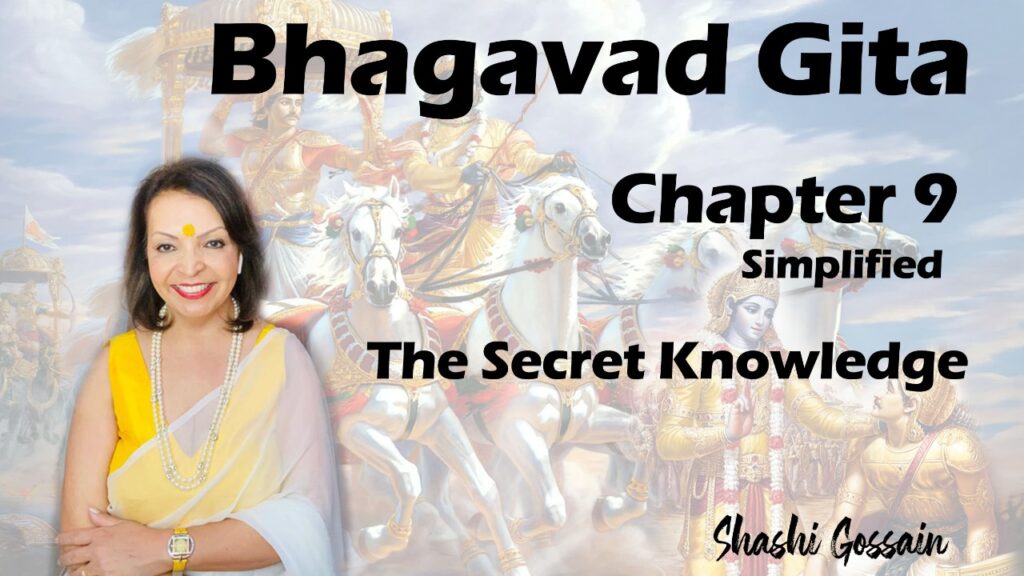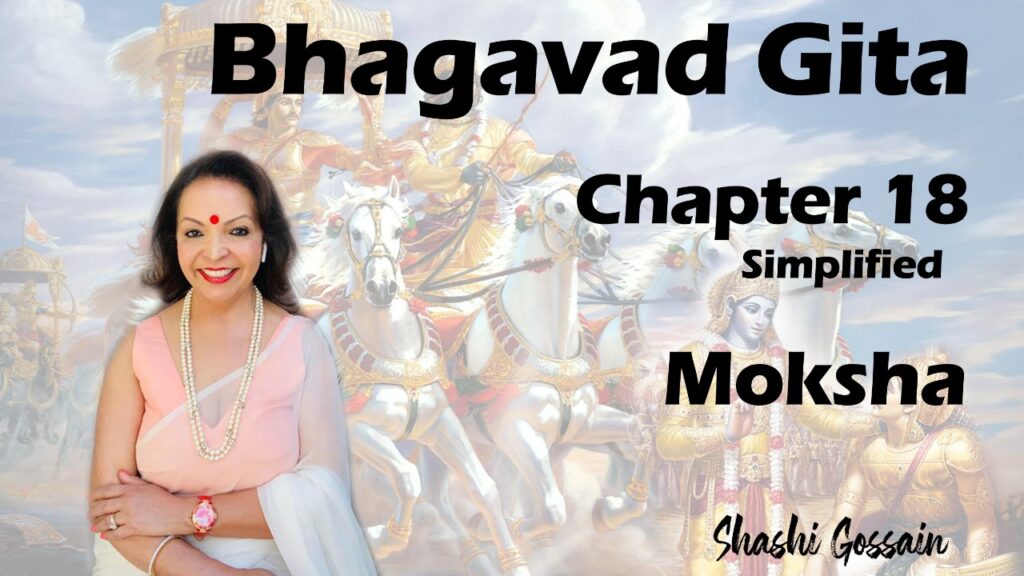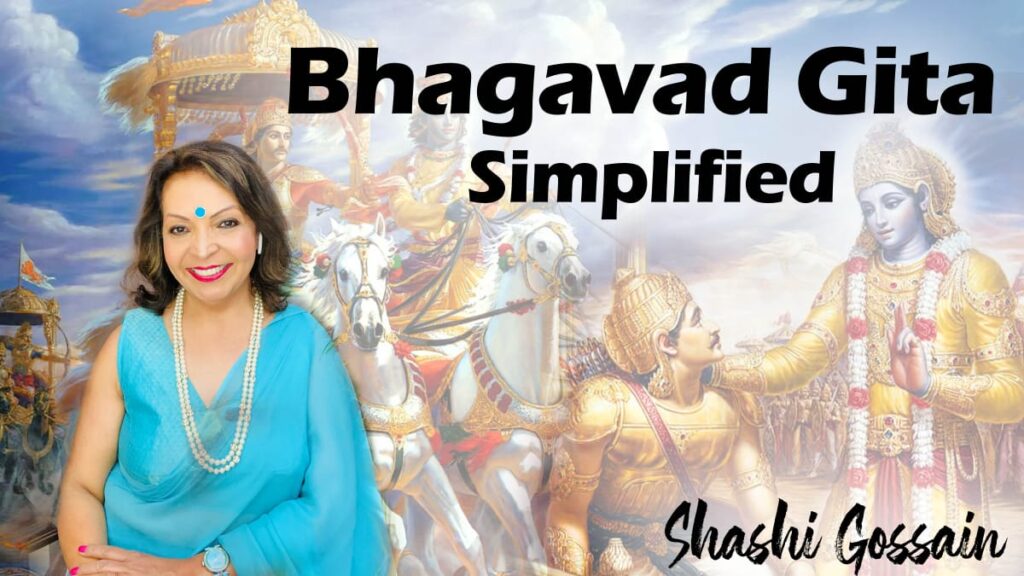Why is the knowledge of Bhagavad Gita secret and confidential?
In the chapter 8 of Shrimad Bhagavad Gita, Krishna mentions the brahma loka, but wants to clarify that getting to heaven is not moksha. Shri Krishna described the endless cycle of creation and dissolution of the universe, and how all beings are stuck in that cycle. Shri Krishna now progresses to the ‘infinite nature of Ishvara’ and ‘finite nature of maaya’. He begins the chapter by asserting that the knowledge of Ishvara’s infinite nature will result in liberation or jivan mukti, and freedom from samsaara or the cycle of life & death, that we are trapped in. Those who have begun the process of purification of their minds through karma yoga and meditation will understand this knowledge completely. The knowledge is said to be secret because even if you hear the teachings, it is rarely understood. It is not arrived at by the normal means of acquiring knowledge, like perception or inference. But with total commitment, compassion, faith, grace and devotion, is success possible. Shri Krishna begins by describing this knowledge as royal (the king among any knowledge), paraa vidyaa (the foremost knowledge of the Absolute) Never again will we become servants to fleeting thoughts or senses. Rituals & sacrifices help us eliminate our sins, but this knowledge eliminates the root cause. Three points are re-iterated:
- Ishavara is in every object, but our mind is conditioned to only see the finite, visible objects. Ishvara is formless & infinite. It is the “building blocks” of every single matter & nature.
- He is like water in all its forms, pervading the whole atmosphere. Everything resides in him.
- Ishvara is not present in an idol, saint or holy place.
What we see through our eyes, hear through our nose, touch through our skin is just a series of names and forms using our own sense organs, which are temporary. All forms disintegrate over a period of time. They are all an illusion, called Ishvara’s maaya that appears & disappears. Very similar to a film on a projector, as we saw earlier. He likens Ishvara to space. Space enables everything to exist within it, like wind, sound waves, light waves, electro-waves. In the same way, all living and non-living entities dwell in Ishvara, the space.
What is the nature of space?
- It is indivisible, which means that even if we try to divide it by building walls, we cannot do so.
- It does not get affected by what it contains.
- No object can ever contain space.
- It pervades everything. Over 99% of an atom is empty space.
- And it is infinite. No object can ever contain space.
What is God according to Geeta?
In Gita, Shri Krishna says that Ishvara is
- Infinite
- Indivisible
- Pervades everything
- Remains unaffected by what he sustains.
So, knowing that Ishvara is everywhere reduces our sorrow, delusion, fear, likes and dislikes. If everything is Ishvara, and if we also know that we are in Ishvara, there is nothing to fear or like or dislike. That is how we get liberated. e.g. Another example is a devoted family. We are part of the family & the family is in us. Similarly, Shri Krishna says, Ishvara is part of us & we are part of him. Now, just like we see the blue sky with our eyes, we also see things and people on this earth being created and destroyed.
What does Prakriti mean?
Prakriti is a system that tracks the karmas or actions of each and every being in the universe. When every being’s karma is exhausted, Shri Krishna, through the medium of Prakriti, begins the process of dissolution, just like we go to sleep when we exhaust all our actions for the day. When the time is right for the next set of actions to begin manifesting, Prakriti projects the beings again. As we saw earlier, creation and dissolution is a matter of perspective, very much like of a film. Prakriti is similar to a movie projector in that it does not create anything new, but projects names and forms on the screen. It creates water in its various forms, but in essence, it’s the same molecules. Similarly, creation and dissolution on a cosmic scale is “real” only if we get stuck at the level of names and forms. Even modern science has not been able to unravel the universe; it has not been able to put names and forms to all the matter. The jnyaani or the wise seeker sees the names and a form come and go, but knows that everything, ultimately, is only Ishvara. Prakriti is Ishvara’s projector. It projects an entire universe of names and forms at the beginning of a cycle, withdraws them at the end of the cycle, only to start it all over again. Shri Krishna says that Ishvara fully controls Prakriti. He is the commander of Prakriti. Shri Krishna clarifies that Ishvara delegates the functioning of the universe to the laws of Prakriti. Prakriti is a system that follows the rules, just like a computer program or the autopilot in an aircraft. Shri Krishna says that we are under the complete control of Prakriti. We helplessly go through infinite cycles of birth and death due to the influence of Prakriti. We don’t know when we are going to die, or take birth. The only way one can get out of Prakriti’s influence is to make an effort towards achieving liberation. Our Puranaas contains several stories about the
- Brahma: creator
- Vishnu: sustainer
- Shiva: destroyer
& their consorts: - Saraswati: knowledge needed for creation.
- Lakshmi: wealth needed for sustenance.
- Parvati: power needed for dissolution.
The stories may portray that these deities personally take effort to perform their duties, but at the universal level, they are all part of the fully automatic system of Prakriti. Like Ishvara, who runs the universe, detached while knowing that Prakriti or deities are doing their part, we too should perform our duties with detachment, knowing that Prakriti is running everything. If we worry about who will get the credit for our actions, then we will get bound, taking us further away for liberation. Only through disassociation with the notion that “I am the doer” and “I obtain the result” can we truly be liberated from the cycle of creation and dissolution.
What Bhagavad Gita says about life?
Shri Krishna gives us a technique to deal with life’s ups and downs. Whenever we encounter a sorrowful or hurtful situation, we need to remind ourselves:
- We have obtained this situation through our own actions and
- It is yet another name and form that Prakriti has created.
Ishvara is not something that is far away, that will take years and years of devotion to achieve. Shri Krishna, through the Gita, has revealed to us the true nature of Ishvara as infinite, in every object, and available right here and now. It is a repeated pointer to respect all beings & objects. Broadly, if we start with the notion that our body and mind is everything and that Ishvara is just a distant finite entity, all our desires and actions will be directed towards ensuring that our body can physically live comfortably. This will not get rid of our sorrows, which is a mental state. For freedom of sorrows, we shall have to get the correct Knowledge. Mahatamas are those who have an unwavering devotion & understood the true nature of Ishvara.
But how do these nobles stay focused on Ishvara?
Firstly, Shri Krishna says that these noble individuals perform the 3 step process:
- Hearing scriptures (shravanam)
- Resolving doubts (mananam)
- Internalizing the knowledge (nidhidhyaasanam).
It is only through this process that the true nature of Ishvara is understood. This has to be constantly repeated, in order to stop our thoughts from straying. Will power by us is needed to stay focused on the Knowledge of Ishvara. Most spiritual traditions encourage practices like fasting or abstaining from pleasures during certain days. Observance of such vows strengthens our will power so that we can use that inner strength towards fending off Prakriti & concentrating at a higher deity. If someone cannot even remain without food for a day, it will be difficult for them to deal with the might of Prakriti, or desires. We also have to trust Ishvara completely. When things are going well, it is easy to accept the will of Ishvara. However, many individuals begin to lose faith in Ishvara when they go through a rough period in their lives. True realization happens when we accept that even the rough period in our life happens for a reason, which reveals over a course of time. So therefore, Shri Krishna says that individuals with these qualities are the true devotees. They always remain united and connected with Ishvara by:
- always recalling the infinite nature of Ishvara
- seeing Ishvara in everything
- continually weaken their individuality
- realizing that all joys/ sorrows are tied to actions
- treating everything as a “prasaada” or Ishvara’s gift
Vedic rituals are carried out during all auspicious occasions. Krishnaji says that Ishvara is in each component of the ritual, including the herbs, butter, fire, offerings, chanting. In our daily lives, Ishvara is present during cooking, in the form of fire, spices, vegetables, oil, utensils, etc Shri Krishna, by redefining action as worship of Ishvara, does not differentiate when and who can worship Ishvara. Sant Kabirdas was a cobbler and Arjuna was a warrior. But both of them could access Ishvara without leaving their respective professions. We have the opportunity to do the very same thing. It is our attitude while performing our work which is most important. Shri Krishna further elaborates on Ishvara’s infinite nature by asserting That he is the father, mother and grandfather of this universe.
- Father’s protects & helps a child to grow.
- Mother creates & nurtures
- Grandfather is extremely attached to his grandchild.
Ishvara treats every being in the universe like a caring family would. Ishvara is also the three Vedas which are ultimate source of knowledge. Their essence is captured in the syllable “Om”, which is the utmost mantra for internal peace. Shri Krishnaji describes Ishvara in 12 words:
- Gatihi: Supreme goal or destination. Our actions lead to our goals
- Bhartaa: The controller & supporter of the entire universe
- Prabhuhu: Provider of the universe
- Saakshi: The unattached witness
- Nivaasaha: The container of the universe
- Sharanam: The ultimate refuge
- Suhrita: Our well-wisher
- Prabhavaha: Creates the universe
- Sthaanam: Maintains the universe
- Pralaya: Dissolves the universe.
- Nidhaanam: Unmanifest beings at the end of creation
- Avyayam beejam: The ultimate seed that creates universe indefinitely.
Ishvara provides the heat as the sun. So when it gets extremely hot, we should recognize that it is Ishvara that is providing the energy for the sun. And even though we may feel uncomfortable, we should realize that Ishvara has the welfare of the entire earth in mind. He creates the water cycle with heat & rain. Ishvara is found as an infinite entity in immortality & a finite in death.
How do we differentiate between real & unreal?
Optical illusions or simple card tricks, or a magician cutting a body in half is perceived by our senses, but in our minds, we know it is not real. Here Shri Krishna encourages us to develop:
- The vision of the essence “tattva drishti” &
- Not of names and forms.
Having described the infinite nature of Ishvara, Shri Krishna describes the devotees or bhaktas. There are two types of devotees:
- Sakaama: desire-oriented, who worships for material gain e.g. money, name or fame. They will attain heaven temporarily & then re-continue the cycle of life & death.
- Nishkaam: desireless who worship with purity.
He has single-minded devotion, with a focused goal. They have no fear, suffering or sorrow. They get the final Liberation or moksha. Krishnaji re-iterates that the worship of deities lead to Ishvara, but it’s still limited & incorrect. That is still finite deity with finite results. Ishvara is infinite and all actions lead to him. E.g. When we feed someone, care for someone, help someone in need, we should know that ultimately we are feeding, caring for and helping Ishvara. This will reduce our sense of ego or I-ness. Ego and attachment are great obstacles in the path of liberation. When we realise that the ultimate owner of everything is Ishvara, it reduces our sense of attachment and “mine-ness”.
What is the correct technique of worshipping Ishvara?
Firstly, Ishvara does not want any expensive gifts. To become his devotee, we can give him something that nature offers in plenty for free: a leaf, a flower, a fruit or even some water. Even in our daily life,to build strong relationships requires actions and attitude. Similarly, to build a strong bond with Ishvara, both our mind and actions have to be engaged in Ishvara’s worship. When we offer a simple gift to Ishvara, but with an attitude of devotion, Ishvara happily consumes the gift. We are offering to Ishvara what was his to begin with. Once we have created this habit of worshipping Ishvara daily in our house, we should slowly bring it out of the house and into every action. We need to learn how to bring divinity into our actions. Krishnaji urges us to perform all actions as an act of worship towards Ishvara. Any action can be converted into an act of worship. e.g.
- Eating: say a silent prayer & then eat as prasad.
- Exercising: causes discomfort initially, which is regarded as tapas, but gets us long term gains.
- Extra hours at work: sacrifice time for long term gains.
Once all actions are devoted to Ishvara, our sense of do-ership will decrease too, leading to a reduction of our stress levels and worries. When we incorporate worship into our life, we shall be free of the results of action. Freedom from results leads to liberation and attainment of Ishvara. This is the ultimate result of living a worshipful life. Karma yoga with Bhakti yoga is complete. An example is if we are working for a successful CEO of a company. We will trust his judgement to give us the right instruction to a successful conclusion. Similarly, once we realize that Ishvara is directing everything, our actions automatically become effortless and fearless. Ishvara will take the responsibility for the results and the consequences. Ishvara is impartial to all, but the results given are entirely proportional to the type of actions taken. Shri Krishna re-iterates that devotion is the easiest means of obtaining access to Ishvara. It is so easy that even a criminal, a sinner in the world can be considered a saint if he worships Ishvara with wholehearted devotion. It can be practised by anyone at any time. All we have to do is to expand this notion of single-minded worship to include everything we do. Those who make a resolve towards devotion, attains everlasting happiness and peace. Apart from Brahmins & Kshatriyas, Shri Krishna says even, “women”, “vaishyas” or “shudras” can take refuge in him. We have to look at some shlokas in its historical & metaphorical context. Most types of spiritual practice require a high level of detachment, but Bhakti yoga doesn’t require this. In this case:
- Women: attached to children
- Trader: attached to money
- Laborer: attached to fruits of his action
Therefore, Shri Krishna praises the path of devotion because anyone who has such deep attachments to worldly matters can still attain liberation through devotion. Anyone can become a devotee. Shri Krishna also explains the reason for seeking the path of devotion. He says that the world in which we live in has two main defects.
- impermanent
- devoid of joy
We usually rush into worldly pursuits such as money, positions, wealth, fame, titles and so on. None of those are permanent or will give long-lasting happiness. We sometimes think that others who possess these things are happier than we are, but that is not true. Impermanence and sorrow is the nature of this world. Shri Krishna gives us guidance on how to cope with all situations. If we make Ishvara as our sole goal in life, any time we serve someone else, we are serving Ishvara. We may encounter people and situations that are unpleasant & disagreeable. Even then, we have to surrender to Ishvara, knowing that it is our past actions that are manifesting as unpleasant but temporary situations. What is the end result? If we are ever engaged with Ishvara throughout our lives, if we make Ishvara our goal and refuge, we will certainly attain him. We will not view the world as different from us. We will see Ishvara in all, and all in Ishavara. And that is The Secret Knowledge.



